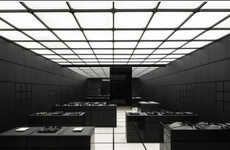Many modern retail shops favor modular designs that enable flexibility—but the new Chilewich store in New York City is a perfect example of a fresh take on this concept.
Rather than adopting a complicated system of movable built-in pieces, the walls of this store are lined with pegboard holes, which make it possible for a number of different displays to be arranged to show off a range of products for the interior of homes. With this innovative system set along the walls, this also creates ample space for the retailer to use display tables to show off products like tableware, place mats and table runners in-situ.
For the design of the Chilewich store in the Flatiron District, De-Spec won awards from both The International Interior Design Association and The American Institute of Architects.
Modular Decor Shops
NYC's Chilewich Store Embraces a Modular Design for Its Interior Displays
Trend Themes
1. Modular Retail Design - The use of modular designs in retail stores creates flexibility and adaptability for showcasing a variety of products.
2. Pegboard Displays - The use of pegboard holes on store walls allows for versatile arrangements of displays and offers opportunities for creative product presentations.
3. In-situ Product Showcasing - Display tables in stores provide the opportunity to showcase products in realistic settings, enhancing customer experience and promoting sales.
Industry Implications
1. Retail Design - The retail design industry can embrace modular concepts and innovative display solutions to create unique and adaptable shopping experiences.
2. Interior Decorating - In the field of interior decorating, the use of pegboard displays and in-situ showcasing can inspire new ways of presenting and envisioning products within homes.
3. Awards and Recognition - The recognition received by De-Spec for the Chilewich store design highlights the potential for innovation and disruption in the architecture and interior design industry.






